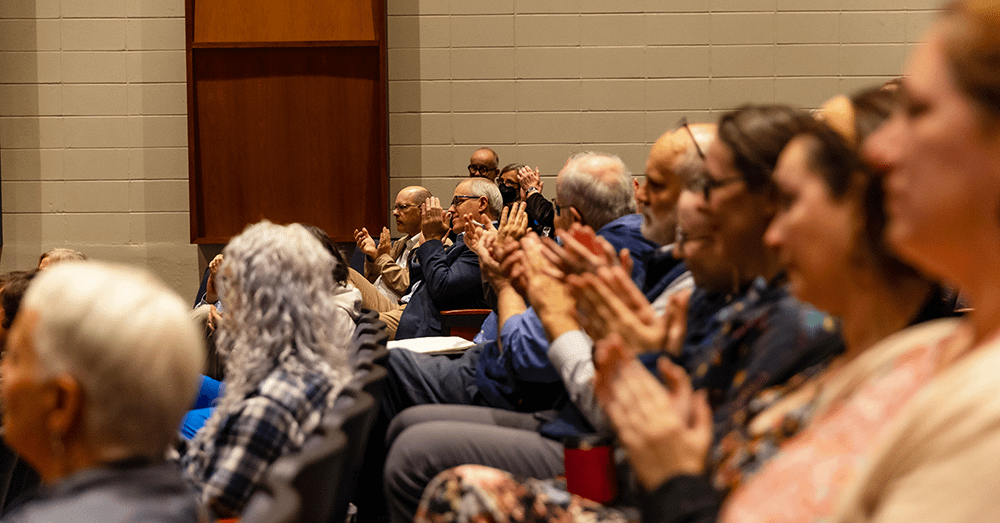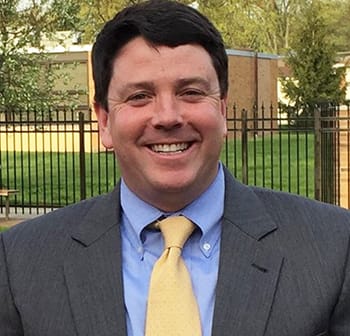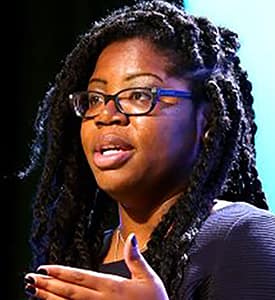Winter MOVE service trips enrich lives

Directly above is the group that volunteered at a school in Buffalo, NY; other shots below accompany accounts of the related trips.
A winter-break trip to New Orleans with seven Saint Michael’s students wasn’t the first MOVE service experience through the College for Kathy Butts ’89 of the Counseling Center staff, who three years ago volunteered at a Utah animal shelter on a similar trip, and decades ago volunteered in Appalachia as a St. Mike’s student.
But she rates the most recent experience near the top. “Traveling with Saint Michael’s students was an absolute joy,” Butts said. “They were hilariously funny, kind to each other, very interested in the community we were working in and wanting to be helpful in whatever way made sense.”
Her words closely reflect experiences described by other leaders from 2018 winter break service trips, sponsored and organized by the Mobilization of Volunteer Efforts (MOVE) office of Saint Michael’s Edmundite Campus Ministry. Besides New Orleans, 10-person groups also went to Baltimore, Utah, Texas, Florida and Buffalo. As in past recent years, each had one faculty/staff leader and one student leader.
“I experienced all the students as flexible, intelligent, really committed to developing an understanding about people in a different part of the country and the issues that affect them,” said Butts.
Building houses, relationships in Louisiana
The main focus in Slidell, LA, explained student volunteer Megan McCauley ’18, was “working with Habitat for Humanity towards affordable housing. Participants help build hurricane safe houses that are then sold for only what it costs to build them, thanks to cutting costs on building materials and labor. By working side by side with site managers, Habitat house recipients, and other volunteers, participants are able to form lasting connections and immerse themselves in the culture, while still learning construction skills. Additionally, the group works towards educational justice by tutoring kids of all ages after school at the Boys and Girls Club.”
The group also visited elders at an assisted living facility on their way to Slidell; while house building, students were thrilled to realize they had skills using power tools once given the chance, their staff leader Butts said, and they loved working with the people whose homes they were helping build. “There was a lot of joy,” said Butts. The group also attended Mass at St. Peter Claver Church in New Orleans, a historically African-American parish long run by the Edmundites; and enjoyed part of a day in New Orleans as tourists. They stayed at a Lutheran church center’s dorm-like accommodations, with some Greek Orthodox seminarians and clergy volunteers who were fun to meet staying in adjoining quarters.
“All the students were super-motivated and hard -working and we got a lot done,” Butts said, adding that the New Orleans suburb of Slidell has been a regular site for these trips since it was so severely damaged by Hurricane Katrina back in 2005 — many neighborhoods are still rebuilding, so many years later.
Helping at a school in Buffalo, NY
Jerome Allen ’09 of the College’s Information Technology staff was a leader to Buffalo, NY, where his group worked at the Liberty Miguel Schools. The middle schools are separated into a boys campus and a girls campus — Saint Monica is for the girls and Saint Augustine is for the boys.
Their tasks, Allen said, included cleaning fish tanks, organizing and updating computers and iPads, organizing the library and helping students pick out books; also, they helped recycle unused and obsolete items and distribute science equipment between the boys and girls schools; attended home and away basketball games; attended Mass; assisted with after-school study hall; took inventory and organized a school store, developing and implementing a currency structure for that school store and aiding students in becoming financially literate.
“Above all we spent time with the students, getting to know them and simply being present with them,” Allen said. “Most of the project work we did was to make sure they have an advantageous experience in school, but spending time with them and helping them with their academics was certainly the highlight.”
Texas preserve: Tree-planting, food bank, kayaking, gator-eating
Carlos Vega of the College’s Admission staff helped lead the trip to Big Thicket Preserve in Kountze, Texas, where groups from St. Mike’s have been going for several years in a row to do service focusing primarily on the environment. It was Vega’s third time leading a MOVE service trip – he previously had taken groups to Hartford, CT, and New York City for more human-services oriented work.

Serving animal friends, building human relationships in Utah
Phung Pham of the Institutional Advancement staff, who had helped lead the Big Thicket Trip last year, loved this year’s week with students volunteering at Best Friends Animal Sanctuary in Utah. “I love doing these trips as it’s an opportunity to connect with students, building relationships that give me perspective and help me remember why I do the work I’m doing,” she said. “It’s a great way to stay young and I learn a lot from students – I believe in teaching young people about service early on.”
Pham said she is an animal-lover though “not an extreme case,” which described most of those on her trip as well. 
They flew into Las Vegas via Chicago and then drove a large van to the Utah shelter located in a small rural town, Kanab Utah, Population 4,400. “We stayed in a home, cooked dinner together at night, did reflections, thinking about what Best Friends is trying to do and what’s happening in the world of animals,” Pham said. They learned about pit bulls and breed discrimination. The shelter has a staff of nearly 400, and all kinds of animals from 800 dogs, 500 cats and many parrots, horses, donkeys, pigs and goats along with a wild animal section.
A major project they completed was building a wall for one of the dog runs which was “very satisfying,” she said. Less glamourous, but necessary, they also did “lots of shoveling and weeding and poop-scooping.”
“We fell in love with every animal we took home at night where we were staying to help with their socialization,” she said. “My key take-away was that a little love and attention brings such responsiveness from animals. It showed us how a little love and compassion can go a long way. Animals show it really clearly.”
Among migrants in Immokalee, Florida
“The MOVE program’s trip to Immokalee, FL, was exactly what the participants needed to see the kind of global impact each of us can have via big choices and small in our lives,” said Bhuttu Mathews of the College’s Security staff, who was the staff leader on the trip.
He said though the group’s work was quite straightforward – house-building with Habitat for Humanity and aiding teachers at the RCMA elementary school – but “the enlightening part was through our relationships with the local community and by experiencing the connections Saint Michael’s College has in that area of the country.”

While in Immokalee the group attended Mass of the Epiphany at the local parish, and engaged in a Q&A session with the Coalition of Immokalee Workers, a group whose work has nationwide impact including the current boycott of Wendy’s restaurants. “As participants we had the opportunity to not only enjoy 70° weather that week (while Vermont endured subzero temps!) but also build fellowship with each other,” Mathews said. “It was immensely gratifying to be part of such a rich tradition of community involvement. Thank you, Saint Michael’s College!”
“Camping In” with Catholic Charities.
Anna Boesch, the MOVE assistant director since coming to St. Mike’s three years ago, led a group to Baltimore to work at an umbrella site for several Catholic Charities organizations.
“We are primary working with adults experiencing homelessness and hunger and transitional housing, so we do everything from meeting the immediate need of serving three meals to playing games with families now in transitional housing, helping them create bank accounts, resumes and find jobs as they work to become a sustainable family,” Boesch said. Her student leader, Connor Fluckiger ’18, was the only male among the 9 student volunteers. This was Boesch’s first time on the Baltimore trip, having served previous years in Kentucky and Immokalee, FL, as well as another trip to Selma, AL at the Edmundite Missions there. This spring break she’ll lead a group to Hartford, CT to work among the homeless and transitioning too.
Catholic charities emphasizes imparting dignity in the serving of meals by having volunteers eat with guests and bringing the food to the tables for them, she said. Each day the group would reflect on the day’s experiences. They had planned to stay in a nearby Catholic-Charities-owned house that by chance was empty that week, but the heat went out the day before they arrived, so they improvised and camped out in a conference room in sleeping bags on the second office floor of the building where they were serving downstairs.
“On the third floor is housing for Christopher’s Place” which is 60 guys in transitional program,” she said. The staff all seem overtly committed to Catholic social teaching, so the group was absorbing that all week, she said, “with lots of conversations around the concept of “dignity-first volunteerism and programming.”
“For me something really impactful was witnessing first-hand and up-close how there is such a vast amount of chronic poverty that exists within the United States – poverty that shouldn’t exist anywhere, but especially in the U.S. with all that we have,” Boesch said.






